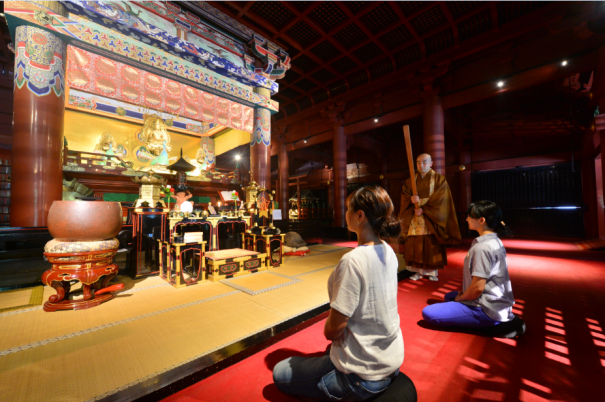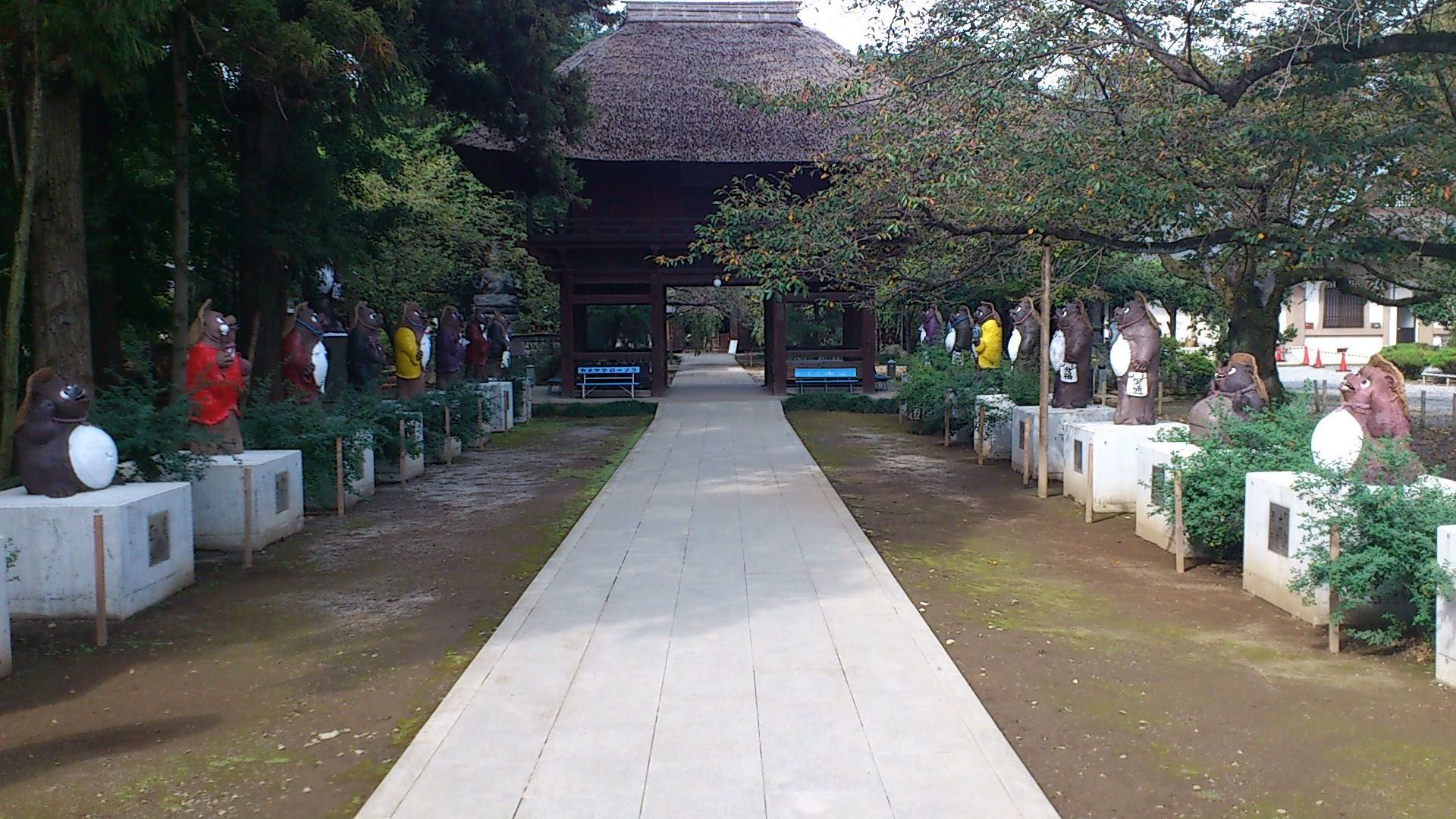TOKYO, Japan - July 22, 2020 - PRLog -- In these times of stress and uncertainty, it is relieving to know that once we can travel again, there are places in the world to travel to that offer the healing qualities of reflection, tranquility and mindfulness. Japan is one of those places.
Practicing Zen in Japan
In Japan, practicing ZEN means both meditation or ZAZEN and mindfulness, which can be achieved by the act of Shakyo or hand copying of Buddhist sutras. Both Zazen and Shakyo may help calm the mind and reduce anxiety. In under two hours north of Tokyo, TOBU Railway's limited express trains bring travelers to places where ZEN can be practiced in its purest surroundings. These include the Nikko area (about two hours north of Tokyo's Tobu Asakusa Station), the Ryomo Area (about 1 ¼ to 2 hours north of Tokyo's Tobu Asakusa Station), and the Kawagoe area (about 30 minutes north of Tokyo's Ikebukuro Station.)
The Effects of ZAZEN
Through Zen Buddhism, it is said, we can see and understand our real selves -- the core of the mind, through ZAZEN practice. Zen teaches us that though we believe our mind orders the actions of whatever we think, most of the time, our minds cannot control our actions. Why? According to Zen, it's because we don't know what our mind actually is.
ZAZEN is Easy
ZAZEN practice is not difficult and is suited for everyone. We can do it every day and anywhere.
- Sit down
- Breathe deeply
- Concentrate on our inner voice
- Connect to the universe.
Zen Buddhism developed as one of the sects of Buddhism founded by the Indian Prince Siddhartha Gautama, 2,500 years ago. Zen Buddhism was introduced to Japan around the Kamakura and Muromachi periods (12th-14th Centuries) at a time when samurai power was rising. ZEN gained immense popularity with the samurai because of its austere and simple rituals, as well as the belief that salvation would come from within, providing an ideal philosophical background for the samurai's own code of behavior. From the Ming Dynasty, ZEN lost its popularity in China and become unique to Japan. Along with the philosophy and practice of ZEN, Japan developed its unique form of simplistic art and garden design, and the rituals associated with the tea ceremony.
Places to Experience Zen in Japan's Kanto Region (near Tokyo)
Nikko Area
・Shakyo & ZAZEN at Rinnoji Temple, a UNESCO World Heritage site in Nikko City
https://www.rinnoji.or.jp/temple/gomadou/, https://www.rinnoji.or.jp/temple/jyougyoudou/
Purchase tickets at Tobu Nikko Station or Kinugawa Onsen Station
・Shakyo and Shabutsu (Copying the Buddha's Image) at Tachiki Kannon Temple in Oku-Nikko (north of Nikko City, Deep Nikko in the mountains with views of majestic Lake Chuzenji) https://www.rinnoji.or.jp/temple/chuzenji/
Purchase tickets at the temple from 8 a.m. (summertime) or 8:30 a.m. (wintertime)
・Shakyo at Onsenji Temple (Rinnoji annex) – A daytrip from Tokyo with hot spring bathing.
https://www.rinnoji.or.jp/temple/onsenji/
Purchase tickets at the temple from 8 a.m.
・Zazen at Manganji Temple (Tobu Nikko Line Tochigi Station)
https://www.tochigiji.or.jp/spot/6127/
Experience: Waterfall meditation, hiking on a mountain path in Okuno-in. Reservations in advance are required (see information at www.idurusan.com)
Ryomo Area
・ZAZEN at Houtokuji Temple
http://www.houtokuji.jp/oterataiken.html
Must see "Floor Maple", autumn leaves reflecting in the floor
・ZAZEN at Morinji Temple
http://www7.plala.or.jp/morin/event2.html
Known for Tanuki (Racoon Dog) Statues along the entrance approach
・ZAZEN & Yoga at Komyoji Temple
(about 5km to the north from Isezaki Line Ashikaga Station, 20 min. by Taxi)
https://www.botandera.com/page00-01/page05-01/
It is known as Peony Temple, colorful peony flowers bloom in late April.
Kawagoe Area
・Shakyo & ZAZEN at Yojuin Temple
https://yojuin.or.jp/shakei-zazen
Reservation in advance is required (yojuin.or.jp/shakei-zazen).
It was founded in 1244. Their big bell is designated as an Important Cultural Property.
At this moment, travel to Japan is not possible, but once travel opens up, these ideal experiences in these welcoming Tobu destinations, await the weary world.
TOBU Railway Company, Ltd. is a major Japanese corporation consisting of approximately 90 companies. The Tobu Railways cover the longest operating distance in Metropolitan Tokyo, leading to numerous tourist attractions including: Asakusa and TOKYO SKYTREE TOWN in Tokyo; Nikko and Kinugawa Onsen, famous for its world heritage sites and hot springs; the Tatebayashi and Ashikaga areas, known for their blooming flower fields; and Kawagoe, where the atmosphere of the old Edo era lives on. Tobu is also invested in a portfolio of hotels, including the highly anticipated The Ritz-Carlton, Nikko and Nikko Fufu Resort (both opening in 2020).
Media Contact
Marian Goldberg Marketing Communications, LLC
in asso w/ QBIC Factory Inc. for Tobu Railways
1-347-559-6462; marian@mariangoldbergcomm.com
Media Contact
Marian Goldberg Marketing Communications, LLC
in asso w/ QBIC Factory Inc. for Tobu Railways
***@mariangoldbergcomm.com
347-559-6462
Photos: (Click photo to enlarge)





Read Full Story - Experiencing Zen & Zazen in Nikko, Ryomo, and Kawagowe Japan (less than 2 hours north of Tokyo) | More news from this source
Press release distribution by PRLog
